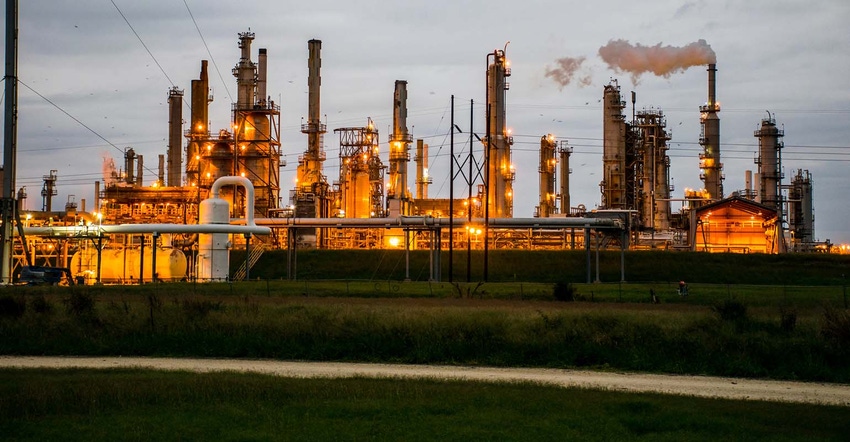
by Laura Blewitt and Mario Parker
After nearly 150 years in business, the biggest U.S. oil refinery east of the Mississippi River has operated through the Great Depression, two world wars and the 1970s Saudi oil embargo. It’s faced more than one shutdown. Now, its owner says a 13-year-old government biofuels mandate brought the Philadelphia fixture to its knees.
When the plant faced collapse in 2012, private equity came to the rescue. Philadelphia Energy Solutions LLC emerged from a joint venture between The Carlyle Group LP and Sunoco Inc., now a subsidiary of Energy Transfer Partners LP.
Back then, the problem was geography. Refineries along the East Coast missed the shale boom that fed plants in Texas and the U.S. Midwest with cheap crude, relying instead on more-expensive imports. The new company invested $130 million in expanding its rail yards to receive trainloads from the Bakken shale formation in North Dakota. This time, the rescue may come through the courts if the refiner can shed its biofuel obligations.
Whether the bankruptcy was caused by flawed government regulations or bad location, it’s sure to intensify the battle between refiners and farmers over the Renewable Fuel Standard, a law that mandates refiners blend biofuels or buy government credits. These credits -- known as Renewable Identification Numbers, or RINs -- hit independent fuel makers without blending operations especially hard. PES said its costs since 2012 exceeded $800 million.
RIN Burden
RIN purchases create an “unpredictable, escalating and unintended compliance burden” that amount to twice the cost of payroll and almost 1-1/2 times capital expenditures, the company said Monday. “Absent RINs, we’re competitive with anyone in the world,” Chief Executive Officer Greg Gatta said in a telephone interview.
While the mandate to buy RINs can create financial burden for merchant-model refiners that don’t blend their own fuels, the obligation isn’t enough to bankrupt a refinery, said Scott Irwin, an economist who focuses on the RFS at the University of Illinois.
“I’m at least skeptical of the argument that it was RINs that drove them to bankruptcy in the first place,” he said by phone from Urbana, Illinois. “There’s so much evidence available that refiners have been able to pass their RINs cost, as expected, through blenders.”
This all comes amid the latest round of the fight between to the two factions that has led to Senator Ted Cruz, a Texas Republican, putting a hold on the appointment of a key position at the U.S. Department of Agriculture. The Trump Administration in late November rejected a bid by fuel-makers including Valero Energy Corp. to relieve refiners of the obligation.
Last fall, billionaire Carl Icahn, majority owner of independent refiner CVR Energy Inc., signaled that the fight over the program could deepen as refineries like PES, among others, wrestle with RIN costs.
“The fight over the point of obligation is certainly not over,” Icahn said in August. “There are a number of refineries in trouble because of it, and many are continuing to fight it.”
Icahn didn’t immediately return messages left for comment.
While crude deliveries by rail helped the East Coast refiners obtain cheaper crude for a while, it hasn’t been a consistent solution. Market economics shifted out of the refiners’ favor once the U.S. lifted its ban on most crude exports and new pipelines allowed North Dakota oil to reach refiners and export terminals along the Gulf Coast. In October, Eastern refiners spent about $6 a barrel more for crude than their competitors in the Midwest, government data show.
Baked In
Analysts from Wells Fargo & Co and Barclays Bank Plc have argued that the cost of RINs is baked in to refining margins. Refiners can easily capture back RIN compliance costs by raising the prices of wholesale gasoline and diesel, according to Irwin. “There has to be a lot more going on than just RIN expenses,” he said.
“The refinery has been on the brink of bankruptcy off and on for the last decade,” Emily Skor, president of Growth Energy, a biofuels trade group said by email. “It’s the nation’s oldest refinery and refused to update its business model to blend biofuels. Further, the refinery declined fast after major oil companies lifted the ban on crude oil exports.”
Advocates for changing the RFS pointed to preserving blue-collar jobs, a key for Trump during the presidential campaign.
“The mechanism for enforcing the RFS is the primary cause for this bankruptcy filing and it must be fixed,” said Republican Pennsylvania Senator Pat Toomey in a statement Monday. “I’ve had extensive conversations with PES management, senior EPA officials, my Senate colleagues, and directly with President Trump in an effort to resolve this situation.”
Jobs Worries
The local United Steelworkers Union as well as the American Fuel & Petrochemical Manufacturers lobby echoed Senator Toomey’s exasperation with lawmakers.
“Now as a result of inaction, union members working for Philadelphia Energy Solutions face an uncertain future,” said Kim Nibarger, National Oil Bargaining chairman. “Continued indifference by the administration and EPA will only drive more East Coast refineries into bankruptcy while thousands of good jobs that allow highly skilled workers to support their families and sustain their communities are at stake.”
The office of Pennsylvania Governor Tom Wolf also called on the Trump Administration to grant waivers. "Without action by the Trump Administration, jobs and future fuel supplies will continue to be put in jeopardy."
--With assistance from Barbara Powell.
To contact the reporters on this story: Laura Blewitt in Houston at [email protected]; Mario Parker in Chicago at [email protected]
To contact the editors responsible for this story: David Marino at [email protected]
Mike Jeffers
© 2018 Bloomberg L.P
About the Author(s)
You May Also Like




